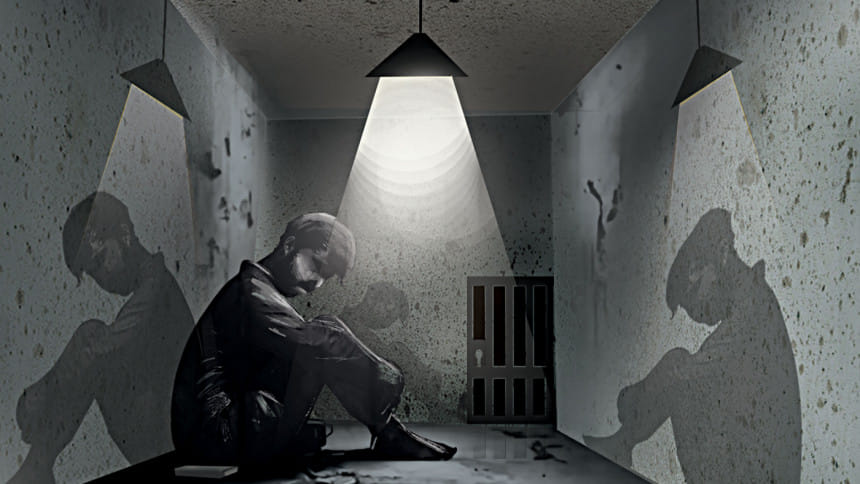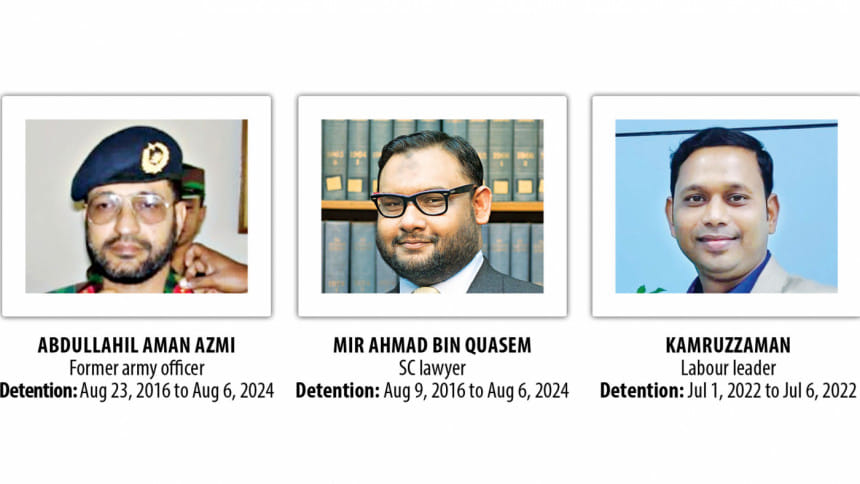Inside the Aynaghar

After years of denial by the authorities, chilling details about secret prisons are now emerging as victims of enforced disappearance begin to speak out after their release following the dramatic fall of Sheikh Hasina's 16-year regime.
Victims who once kept themselves shut are now providing distressing accounts of these detention facilities, commonly known as "Aynaghar," (house of mirrors), where victims of enforced disappearance were held in inhuman conditions over the last one and a half decades.
Although these victims come from different age groups and political and social backgrounds, their narratives of these thick-walled, iron-door prison cells are strikingly similar.

Piecing together the details of their narratives, it is now clear that many of these facilities were run by the Directorate General of Forces Intelligence (DGFI), which operates under the defence ministry. DGFI heads are reportable directly to the prime minister and prime minister's security adviser.
These facilities are notorious for their complete isolation, with detainees unable to see any light from the outside world.
The Daily Star spoke to four such victims who endured mental and physical torture inside these secret prisons for days, months and even years during the Awami League regime.
CHT-based United People's Democratic Front (UPDF) leader Mikel Changma is one of them. After five years of captivity since April 2019, he was freed just two days after Hasina fled the country in the face of a popular uprising.
"For the first time in five years, I saw daylight in the early hours of August 7 when they released me," Mikel told The Daily Star, adding that he was unaware of the August 5 political changeover.
"Upon investigation of the alleged enforced disappearance cases, the findings reveal that people often disappear voluntarily to avoid legal action for cases lodged against them."
Former Bangladesh ambassador to Vietnam Maroof Zaman had gone missing on December 4, 2017, and returned home after nearly 16 months (467 days) in March 2019. Talking to this newspaper yesterday, he narrated how his captors tried to establish him as an anti-government element.
His accounts also clearly indicate that his captors were linked with the army, as he saw words like "Sena" (army) in the water bottles; Defence Medicine, trading prohibited, on the medicine leaf; and Station Headquarters Library and Senabahini Library in the Quran he was provided during his captivity.
The two other victims are Kamruzzaman, president of Grameen Telecom Workers Union, and its General Secretary Firoz Mahmud Hasan. Their 2022 captivity in the so-called Aynaghar was short – only seven days – but their secret imprisonment appears to be directly linked to Sheikh Hasina's reported dislike of Prof Muhammad Yunus.
Both said they were forced to give confessional statements against Yunus. They were also forced to claim that they coerced workers into withdrawing the cases against the Nobel laureate after secretly agreeing with the Grameen Telecom authorities in exchange for money.
Aynaghar victims talked with The Daily Star -
FALSEHOOD FALLS APART
The AL government has persistently denied the existence of the secret prisons run by security forces, and maintained that the term "enforced disappearance" was used to malign the government and its achievements.
"Upon investigation of the alleged enforced disappearance cases, the findings reveal that people often disappear voluntarily to avoid legal action for cases lodged against them. Sometimes they choose to disappear due to family feud or to avoid business liability, and some often willingly disappear with the intention of embarrassing the government," the government wrote to the UN on May 12, 2022.
But this version started falling apart after the release of former army brigadier general Abdullahil Amaan Azmi and Mir Ahmad Bin Quasem on August 6, the day after Sheikh Hasina's fall. Azmi, son of late Jamaat leader Ghulam Azam, and Ahmad, son of executed Jamaat leader Mir Quasem, were held in secret prisons for eight years.
"I was kept in darkness, not allowed to see the light of day. Even the ventilator in the room was sealed off," Azmi said in a video posted on social media after his release.
In a recent interview with AFP, Barrister Ahmad, a defence lawyer fighting the war crimes case against his father when he simply vanished, shared his ordeal inside Aynaghar and how he got fresh air for the first time in eight years.
"Slowly, slowly, I could realise that I am not alone," he said. "I could hear people crying, I could hear people being tortured, I could hear people screaming."
The story of Aynaghar first came to light on August 14, 2022, when Netra News, a Sweden-based news portal, revealed in a report the location of a secret prison in which the victims of enforced disappearances were kept.
For over a decade, hundreds of families in Bangladesh have lived with the unbearable pain of not knowing the fate of their loved ones. These individuals—mostly critics of the government and members of the opposition parties—disappeared during its 16-year rule, allegedly abducted by state agencies.
In its 2021 report, Human Rights Watch said that security forces have committed over 600 enforced disappearances since Hasina came to power in 2009.
While some people were later released, produced in court, or said to have died during gunfire exchanges with security forces, nearly 100 people were still missing, HRW said.
Rights activists have noted an increase in enforced disappearances before and after elections, as well as during political movements.
According to rights organisation Odhikar, at least 708 people were victims of enforced disappearance between 2009 and June 2024. Of these incidents, 454 occurred between 2013 and 2018, during which Bangladesh held two general elections.
Odhikar data show that 98 people were victims of enforced disappearance in 2018, 95 in 2017, 97 in 2016, 69 in 2015, 41 in 2014, and 54 in 2013. In the lead-up to the last election, state agencies allegedly abducted 54 people in 2023.
AN INVITE TO AYNAGHAR
On August 6, members of Mayer Daak, a platform for family members of victims of enforced disappearance, gathered in front of the DGFI office inside Dhaka cantonment seeking information about their missing relatives.
Azmi and Ahmad, also known as Arman, suddenly returned home that day, and Mikel the next day.
At a meeting with DGFI on August 6, a six-member team including rights activists and a UN representative, demanded access to the detention facility. The team was allowed to visit the DGFI headquarters on August 7.
After coming out from the facility, rights activist Shireen Huq told families of some victims, "They invited us to visit the facility. The DGFI said there were no detainees in their Dhaka facility. They also said that they will form a joint commission to arrange visits for rights activists to 23 other facilities across the country to see if the victims of enforced disappearance are there."
Home Adviser Lt Gen (retd) Jahangir Alam Choudhury and Law Adviser Asif Nazrul did not respond to our calls and text messages seeking their comments. Inter Services Public Relations Directorate (ISPR) also declined to comment, saying it does not deal with matters related to DGFI.
At a meeting with members of Mayer Daak on August 13, Prof Yunus expressed deep concerns after hearing the distressing accounts of families whose loved ones have gone missing over the years.
On Sunday, the platform sent a list of 158 missing people to DGFI.
Afroza Islam Akhi, cofounder of Mayer Daak, told The Daily Star that the interim government has assured them that it will address their concerns.
"We saw that Lt Gen Ziaul Ahsan was arrested and placed on remand. This was one of our demands to investigate his role. We have also demanded the formation of an enquiry commission, which they agreed to," she said, adding that they also want information about the numerous secret detention cells across the country.
Nur Khan Liton, a noted rights activist who has long been voicing concerns about enforced disappearance, said many people still remain unaccounted for after being taken away by alleged state agencies.
"It is time to demand their release or for the state to provide information on their whereabouts," he said.


 For all latest news, follow The Daily Star's Google News channel.
For all latest news, follow The Daily Star's Google News channel. 









Comments